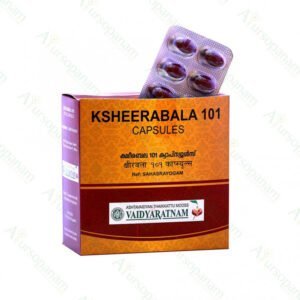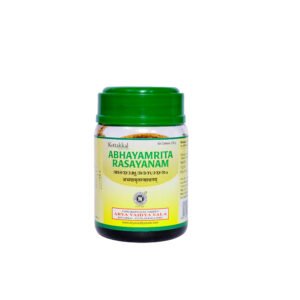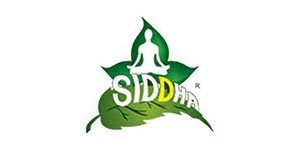‘Khadira’ is the Sanskrit name of the Cutch tree, hailed by Ayurveda for being a skin tonic. Heartwood is the part used, and it strengthens the skin tissue and equips it against infection and disease. Khadirarishtam combines the blood purifying properties of Acacia catechu with digestive and appetite-stimulating drugs.
Arishtas are mildly alcoholic preparations. The sweet taste of Khadirarishtam syrup makes it palatable to kids and adults alike. The alcohol base makes it quick-acting and efficient.
Features & Benefits
- Khadira is renowned as a potent blood purifier. Khadirarishtam pacifies the heat and viscidity of deranged Pitta in the blood. This reflects robust skin that is not prone to infection or disease.
- It improves the health and functioning of the liver and kidneys, the prime organs that cleanse the body from within.
- It cleanses the circulatory pathways. Khadirarishtam syrup also expels metabolic toxins.
- It enhances the quality and quantity of the circulating blood and lymph.
- It improves appetite, digestion and absorption in the gut. Ensures consistent bowel movement.
Dosage and Instructions
Adult: 25-30 ml Khadirarishtam syrup twice or thrice daily after food.Child: 10-15 ml Khadirarishtam syrup once or twice daily after food.
Key Ingredients
Khadira (Acacia catechu)
It is commonly known as Karingali, used for stomach problems such as diarrhea, swelling of the colon (colitis), and indigestion. It is also used orally for pain from osteoarthritis and topically to treat pain, bleeding, and swelling (inflammation).
Devadaru (Cedrus deodara)
Also is known as Cedrus deodara or Himalayan cedar, Devadaru is very effective in neurological disorders, asthma, pruritus, and infested wound. Devadaru is also effective in arthritis and headache. Deodar oil contains two major sesquiterpenoids a and ß- himachalenes. Deodardione are also isolated from the essential oil. The oil shows invitro antibacterial, antifungal and anti-inflammatory activity.
Daruharidra (Berberis aristata)
Also known as haldi, this vibrant yellow coloured spice checks the worsening of Pitta doshas like jaundice. The powerful anti-inflammatory and antiseptic properties of turmeric help in evading infections and treats various skin conditions. Tree Turmeric is a revered herb in Ayurvedic medicine. Possessing antibacterial, anti-inflammatory, antipyretic and antiseptic properties, the herb is used as a cholagogue, stomachic, laxative and diaphoretic.
Hareethaki (Terminalia chebula)
Popularly known as Indian walnut for its innumerable benefits or Indian hog plum in English, it is extremely valuable for its role in improving hair health. It is useful for treating scalp infections like dandruff, itching and hair fall. It also strengthens them from the roots, prevents breakage and loss of hair and bestows silky soft, smooth hair. Chebulic Myrobalan is one of the three key ingredients in Triphala, a natural compound that provides overall support for digestive function and helps ensure that the digestive tract works at optimal levels. The Ayurvedic Pharmacopoeia of India has documented the use of the powdered herb in intermittent fevers and chronic fevers, anaemia and polyuria. Chebulic Myrobalan can also be used to treat gastrointestinal and respiratory disorders.
Amalaki (Emblica officinal)
It is commonly known as the Indian gooseberry is high in Vitamin C and natural antioxidants known as flavonoids and polyphenols. When used for hair treatments, it is found to strengthen and condition follicles down to the roots. Amla oil can promote hair growth, reduce dandruff, and prevent the greying of hair.
Vibhithaki (Terminalia Bellerica)
Known as Beach almonds or Bedda nut tree, Vibhitaki is rich in Vitamin C and other antioxidants that nourish the hair roots. Vibhitaki helps in making the roots of the hair stronger, minimizing hair fall and preventing premature greying of hair strands.
Nagakesara (Messua ferrea)
Ironwood Tree possesses many therapeutic benefits. It is a hemostatic that stops bleeding and is also an anti-inflammatory. The Ayurvedic Pharmacopoeia of India recommends the use of the plant in gout, hemorrhagic disorders and diseases of the urinary bladder.
Ela (Elettaria cardamom)
Ela is commonly used as Elaichi. It has a very good antibacterial and antifungal properties. It helps in reducing inflammation. Cardamon is often given the epithet ‘Queen of spices’ as it is used to flavour food in many countries. in addition, the herb has several health benefits. The German Commission E has indicated the use of Cardamom in dyspepsia and as a cholagogue, which promotes bile discharge from the system. The herb is also helpful in treating gum and teeth infections, throat congestion and kidney disorders
Twak (Cinnamom verum)
Twak also known as Cinnamom verum is used for neurological disorders, cardiovascular diseases, oxidative stress, inflammatory disorders, diabetes, microbial infections, cancer and other conditions extensively in Ayurveda.
Patra (Cinnamomum tamala)
Patra is also called Tejpatta, and Tejpat, in English named as Indian Bay Leaf, and botanically known as Cinnamomum Tamala, is an Indian spice as well as an Ayurvedic medicine. Additionally, it stimulates the digestive enzymes, which help to improve the digestion of food and increases the bioavailability of the nutrients during the digestion process in the intestine.
















































Ratings & Customer Reviews
Reviews
There are no reviews yet.